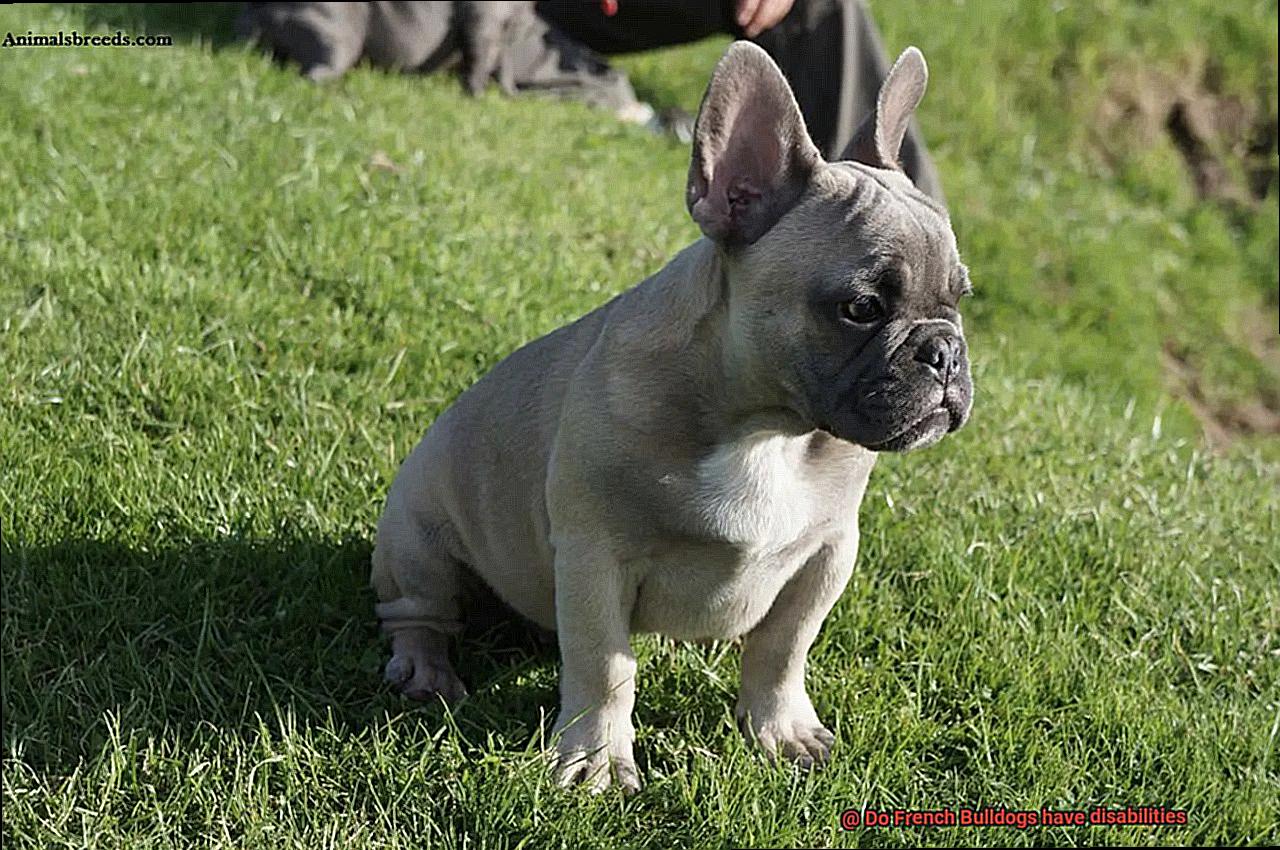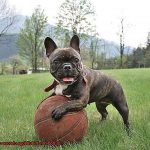Do French Bulldogs have disabilities?
Get ready to dive headfirst into the captivating world of French Bulldogs. These little cuties with their adorable bat-like ears and soulful eyes have stolen our hearts. But let’s address the elephant in the room – are these lovable pooches prone to disabilities?
In this article, we’re here to bust myths and reveal the truth about French Bulldogs and any potential disabilities they may face. Sure, like any breed, they might encounter a few health hiccups along the way. But fear not, we’ll explore just how serious these issues are, what causes them, and most importantly, how we can prevent them.
So grab a cuppa joe or your go-to beverage of choice, find a cozy nook, and join us on this exhilarating adventure as we unravel the reality behind French Bulldogs and their supposed disabilities. It’s time to separate fact from fiction and gain a deeper understanding of these enchanting creatures who have captured our hearts.
What is Brachycephalic Obstructive Airway Syndrome (BOAS)?
Contents
- 1 What is Brachycephalic Obstructive Airway Syndrome (BOAS)?
- 2 Intervertebral Disc Disease (IVDD) in French Bulldogs
- 3 Hip Dysplasia in French Bulldogs
- 4 Eye Conditions in French Bulldogs
- 5 Preventing and Managing Disabilities in French Bulldogs
- 6 Appropriate Diet and Exercise for French Bulldogs
- 7 Regular Veterinary Check-Ups for French Bulldogs
- 8 Creating a Safe Environment for French Bulldogs
- 9 Conclusion
French Bulldogs are beloved companions known for their adorable appearance and affectionate nature. However, their unique physical characteristics make them prone to certain health conditions, including Brachycephalic Obstructive Airway Syndrome (BOAS). In this comprehensive guide, we will explore what BOAS is, its causes, symptoms, diagnosis, and management strategies to ensure the well-being of your French Bulldog.

What is Brachycephalic Obstructive Airway Syndrome (BOAS)?
BOAS is a common condition that affects brachycephalic breeds like French Bulldogs. It results from anatomical abnormalities in the airways, which obstruct proper breathing. These abnormalities are primarily caused by the breed’s short snout and skull shape.
Causes of BOAS in French Bulldogs:
- Shortened and narrowed air passages
- Compressed nasal cavity
- Elongated soft palate
- Narrowed windpipe
- Small nostrils
Symptoms of BOAS:
- Noisy breathing
- Snoring
- Wheezing
- Difficulty breathing during exercise or stress
- Excessive panting
- Gagging or regurgitation
- Fainting (in severe cases)
- Open-mouth breathing
- Cyanosis (blue tint to the gums)
- Collapse
Diagnosis of BOAS:
A thorough physical examination by a veterinarian is necessary for diagnosing BOAS in French Bulldogs.
The vet will assess breathing sounds, respiratory effort at rest and during exercise, and overall body condition. Diagnostic tests such as radiographs, endoscopy, or computed tomography scans may be recommended to assess the severity of airway obstruction.
Management strategies for BOAS:
- Weight management: Maintaining a healthy weight can alleviate airway obstruction.
- Exercise restriction: Avoiding strenuous activities can reduce breathing difficulties.
- Environmental modifications: Minimize stress and heat exposure to prevent respiratory distress.
- Surgical interventions: Soft palate resection, nostril widening (rhinoplasty), and laryngeal saccule removal may be necessary for severe cases.
Intervertebral Disc Disease (IVDD) in French Bulldogs
French Bulldogs are beloved companions known for their charming personalities and adorable appearance. However, they are prone to certain health conditions that can impact their quality of life. One such condition is Intervertebral Disc Disease (IVDD), a spinal condition that affects the discs between the vertebrae in their spine. In this article, we will explore the causes, symptoms, treatments, and prevention of IVDD in French Bulldogs.
Causes of IVDD in French Bulldogs:
- Unique Body Structure: French Bulldogs have a compact and muscular body with a short spine, putting added stress on their intervertebral discs and making them more susceptible to degeneration and herniation.
- Genetic Predisposition: French Bulldogs often have a genetic predisposition to degenerative disc disease, increasing their risk of developing IVDD.
Symptoms of IVDD in French Bulldogs:
- Back Pain: Mild cases may present with back pain and stiffness.
- Mobility Issues: Difficulty jumping, climbing stairs, or walking properly may be observed.
- Weakness or Paralysis: In severe cases, IVDD can cause weakness or even complete paralysis in the hind legs.
Treatment Options for IVDD:
- Conservative Management: Mild cases can often be managed with rest, pain medication, and physical therapy to strengthen the supporting muscles around the spine.
- Surgical Intervention: Severe cases or when conservative management fails may require surgery to remove damaged disc material or stabilize the spine.
Prevention of IVDD in French Bulldogs:
- Maintain a Healthy Weight: Excess weight puts strain on the spine, so it is important to keep your French Bulldog at a healthy weight.
- Provide Supportive Environment: Use ramps or steps to reduce strain on your dog’s spine when climbing or descending elevated surfaces.
- Genetic Testing and Responsible Breeding: Opt for genetic testing and responsible breeding practices to decrease the prevalence of IVDD in French Bulldogs.

Hip Dysplasia in French Bulldogs
It occurs when the ball and socket of the hip joint do not fit together properly, resulting in pain, lameness, and difficulty in walking or running. French Bulldogs are particularly vulnerable to hip dysplasia due to their unique body structure, with their compact build and short legs putting extra stress on their hip joints.
The exact cause of hip dysplasia in French Bulldogs is not fully understood, but it is believed to be a combination of genetic and environmental factors. Genetics play a significant role, so when choosing a breeder, it’s important to prioritize dogs with good hip scores and avoid those with a history of hip dysplasia. Environmental factors such as rapid growth, excessive weight gain, improper nutrition, and overexertion can also contribute to the development of hip dysplasia.
Symptoms of hip dysplasia in French Bulldogs include discomfort or stiffness after exercise or rest, a bunny hop-like gait, and difficulty getting up or climbing stairs. If you notice any of these symptoms, it’s crucial to visit your veterinarian for a proper diagnosis.
Treatment options for hip dysplasia vary depending on the severity of the condition. In mild cases, management strategies like weight control, exercise modification, physical therapy, and nonsteroidal anti-inflammatory drugs (NSAIDs) can help alleviate symptoms and improve mobility. More severe cases may require surgical intervention, such as femoral head ostectomy or total hip replacement.
To prevent hip dysplasia in French Bulldogs, responsible breeding practices are essential. Choose breeders who prioritize good hip scores in their breeding pairs. Additionally, maintaining a healthy weight for your Frenchie, providing appropriate exercise and nutrition, and regular vet check-ups can help reduce the risk of hip dysplasia.
Eye Conditions in French Bulldogs
French Bulldogs are prone to various eye problems that can impact their vision and overall well-being. In this comprehensive guide, we will explore the most common eye conditions seen in French Bulldogs, including cherry eye, entropion, cataracts, dry eyes, and progressive retinal atrophy. We will delve into each condition, discussing their symptoms, available treatment options, and practical preventive measures.
Cherry Eye:
Cherry eye occurs when the gland in the third eyelid becomes inflamed and protrudes, resembling a cherry. This condition can cause discomfort and irritation for your Frenchie. Surgical intervention is often necessary to correct this condition and prevent further complications.
Entropion:
Entropion is a condition where the eyelids roll inward, leading to irritation and potential corneal ulcers. Early detection is vital for preventing long-term damage to your Frenchie’s eyes. Surgery is usually required to correct entropion and alleviate symptoms effectively.
Cataracts:
Cataracts are opacities that form in the lens of the eye, resulting in vision impairment or even blindness if left untreated. In severe cases, surgical removal of cataracts may be recommended to restore clear vision.
Dry Eyes (Keratoconjunctivitis Sicca):
Dry eyes occur when there is insufficient tear production, causing discomfort and potential damage to the cornea. Treatment includes medications or artificial tears to lubricate the eyes and manage symptoms effectively.
Progressive Retinal Atrophy (PRA):
PRA is a genetic condition that causes progressive degeneration of the retina over time, leading to vision loss. While there is no cure for PRA, regular eye examinations can aid in early detection and management of the condition, supporting your Frenchie’s quality of life.
Prevention and Management:
Regular veterinary eye examinations are vital for early detection and management of these eye conditions in French Bulldogs. Proper eye hygiene, such as regular cleaning of your Frenchie’s eyes, can help prevent irritation and infections. Avoiding exposure to environmental irritants is also crucial. Responsible breeding practices, including health screenings for genetic eye disorders, can minimize the risk of passing on these conditions to future generations.
Preventing and Managing Disabilities in French Bulldogs
French Bulldogs are beloved companions known for their playful personalities and distinctive features. However, like any breed, they can be prone to certain disabilities. In this guide, we will explore preventive measures and management strategies to ensure your French Bulldog leads a healthy and fulfilling life.
Brachycephalic Airway Syndrome (BAS):
With their short noses and flat faces, French Bulldogs are susceptible to Brachycephalic Airway Syndrome (BAS). To prevent BAS, choose a reputable breeder who prioritizes their dogs’ health. Look for longer muzzles and open nostrils in the lineage. Regular exercise and maintaining a healthy weight are vital in preventing breathing problems.
Hip Dysplasia:
Hip dysplasia, causing pain and lameness, affects the hip joint of French Bulldogs. While genetics play a part, diet and exercise are essential in managing this condition. Provide a balanced diet rich in omega-3 fatty acids and glucosamine to reduce inflammation and promote joint health. Low-impact, controlled exercise helps avoid strain on the hips.
Intervertebral Disc Disease (IVDD):
French Bulldogs are prone to Intervertebral Disc Disease (IVDD), leading to pain, paralysis, and loss of bladder control. Preventive measures include avoiding activities that strain the spine and regular veterinary check-ups to catch signs early on. Prompt treatment is vital for managing IVDD effectively.
Allergies:
Allergies in French Bulldogs result in skin problems and discomfort. Identify and avoid allergens that trigger reactions. Regular grooming and good hygiene practices prevent skin issues related to allergies. In severe cases, allergy testing or medication may be necessary.
Appropriate Diet and Exercise for French Bulldogs
Our adorable little bat-eared buddies require special attention when it comes to their diet and exercise routine. In this blog post, we will explore the importance of providing a balanced diet and appropriate exercise for French Bulldogs, helping you keep your furry friend fit, fabulous, and full of life.
French Bulldogs are prone to weight gain and obesity, so it’s crucial to provide them with a balanced diet. Consider these tips:

Choosing the Right Food:
- Opt for high-quality dog food formulated for small breeds.
- Look for well-balanced options that provide essential nutrients without excessive calories.
- Avoid cheap fillers or artificial additives that can lead to digestive issues.

Mealtime Mantras:
- Feed your French Bulldog two to three small meals a day instead of one large meal.
- Prevent bloating and aid digestion for optimal nutrient absorption.
- Make mealtimes engaging with puzzle toys or slow-feeders.
Portion Control is Key:
- French Bulldogs have a tendency to gain weight easily, straining their joints.
- Consult with your veterinarian for appropriate portion sizes based on age, weight, and activity level.
- Resist those pleading puppy-dog eyes.
Paws in Motion – Exercising with Care
To maintain a healthy weight and prevent obesity, exercise is essential for French Bulldogs. Consider these guidelines:
Low-Impact Activities:
- Due to their unique physical characteristics, French Bulldogs aren’t built for intense activities.
- Opt for short walks or gentle playtime in controlled environments.
- Keep them active without straining their bodies.
Weather Watch:
- French Bulldogs are sensitive to heat and humidity, prone to overheating and breathing difficulties.
- Avoid exercising during the hottest parts of the day or extreme weather conditions.
- Watch for signs of heatstroke like excessive panting or drooling.
Mental Stimulation Matters:
- Engage your Frenchie’s mind with interactive toys, puzzles, or training sessions.
- Mental stimulation is as important as physical exercise, preventing boredom and destructive behaviors.
Regular Veterinary Check-Ups for French Bulldogs
Regular veterinary check-ups are crucial for the overall health and well-being of French Bulldogs. These adorable little dogs may be prone to certain health issues and disabilities, making regular check-ups even more important. So, why exactly are regular veterinary check-ups essential for French Bulldogs?

First and foremost, regular check-ups allow for early detection and prevention of potential health problems. French Bulldogs are known to have certain genetic predispositions, such as respiratory problems and skin allergies.
By bringing your French Bulldog in for regular check-ups, your veterinarian can closely monitor their health and spot any signs of these conditions before they become serious. Early detection often leads to more effective treatment options and can significantly improve your dog’s quality of life.
During a veterinary check-up, your veterinarian will conduct a thorough examination of your French Bulldog. They will check their weight, temperature, heart rate, respiratory rate, and overall physical condition.
This comprehensive examination ensures that no aspect of your French Bulldog’s health goes unnoticed. The vet will also assess the dog’s eyes, ears, teeth, skin, and coat for any signs of abnormalities or potential health problems. They will pay special attention to the French Bulldog’s breathing, as they are prone to respiratory problems. Any signs of difficulty or labored breathing can be addressed promptly.
Regular check-ups also involve vaccinations and preventive treatments for common parasites such as fleas, ticks, and worms. These measures help protect your French Bulldog from potentially harmful diseases and ensure their overall well-being. Additionally, the vet may recommend additional preventive measures based on the specific needs of your French Bulldog, such as heartworm prevention or dental cleanings.
Furthermore, regular check-ups allow the vet to monitor your dog’s growth and development. French Bulldogs are known for their adorable compact size, but it’s important to ensure that they are growing at a healthy rate and meeting important milestones. Regular check-ups enable veterinarians to detect any growth abnormalities or delays in development early on.
Lastly, regular veterinary check-ups provide an opportunity for owners to discuss any behavioral concerns or questions they may have regarding their French Bulldog’s health and well-being.
Your veterinarian is a valuable resource for information and advice, and regular check-ups give you the chance to address any concerns or seek guidance on topics such as training, nutrition, and exercise.
Creating a Safe Environment for French Bulldogs
It is important to recognize that French Bulldogs require special attention when it comes to their health and well-being. In this guide, we will explore the steps you can take to create a safe and secure environment that promotes your French Bulldog’s overall health and happiness, while also preventing common disabilities and health issues. Let’s embark on this journey of creating a sanctuary for your beloved companion.
Temperature control:
French Bulldogs, with their distinctive brachycephalic features, are more susceptible to heatstroke and respiratory problems. To ensure their safety, make sure your home has proper ventilation and keep your furry friend in cool areas during hot weather. Avoid strenuous activities during peak temperatures and provide fresh water at all times.
Comfortable sleeping arrangements:
To protect their delicate spines, provide your French Bulldog with a supportive bed or crate that allows them to rest without putting strain on their back. Activities involving jumping or excessive running should be avoided, as they can increase the risk of spinal injuries.

Eye care:
French Bulldogs are prone to various eye problems that can cause discomfort and even vision loss. Keep their eyes clean and free from irritation by gently wiping them with a damp cloth. Regular check-ups with your veterinarian are essential for early detection and treatment of eye conditions. Additionally, avoid exposing your pup to irritants like dust or smoke to maintain their ocular health.
Joint health:
Preventing joint issues such as hip dysplasia, patellar luxation, and arthritis is crucial for the well-being of French Bulldogs. Maintaining a healthy weight is key to reducing stress on their joints. Engage them in low-impact exercises like short walks or swimming, which promote muscle strength without straining their joints. Joint supplements recommended by your veterinarian can also be beneficial in supporting their joint health.
Allergy management:
French Bulldogs are known to have sensitive skin and can be prone to allergies. Identifying potential allergens, such as certain foods or environmental triggers, is important in managing their allergies effectively. Make necessary adjustments to their diet or living environment to minimize exposure to these allergens. Regular grooming practices, including cleaning their paws after walks, can also help manage allergies and keep their skin healthy.
f3XueAlb5Q4″ >
Conclusion
In conclusion, it is important to acknowledge that French Bulldogs can indeed have disabilities.
While they are generally a healthy breed, certain genetic factors and breeding practices can contribute to various health conditions that may result in disabilities. These disabilities can range from respiratory issues, such as brachycephalic airway syndrome, to musculoskeletal problems like intervertebral disc disease.
Regular vet check-ups, responsible breeding practices, and providing a safe and comfortable environment can all contribute to minimizing the risk of disabilities in French Bulldogs.




